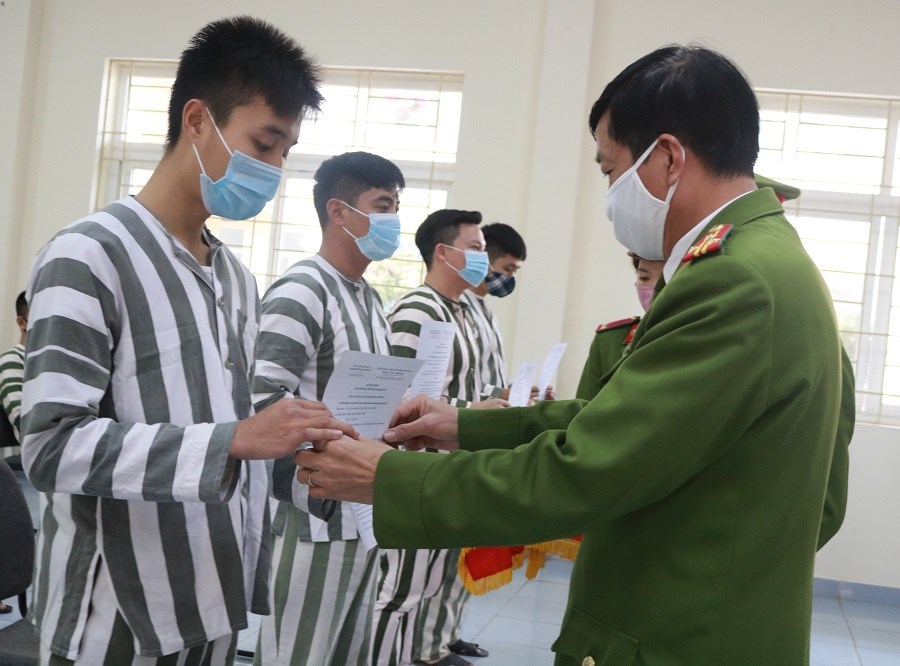Cases of extracting a person sentenced to death out of the cell in Vietnam
What are the cases of extracting a person sentenced to death out of the cell in Vietnam? - Anh Nguyet (Tien Giang, Vietnam)

Cases of extracting a person sentenced to death out of the cell in Vietnam (Internet image)
Regarding this issue, LawNet would like to answer as follows:
1. Cases of extracting a person sentenced to death out of the cell in Vietnam
Cases of extracting a person sentenced to death out of the cell under Clause 1, Article 10 of Circular 39/2012/TT-BCA include:
- Seeing a lawyer or other advocate. Lawyers or other defense counsel, upon encountering one another, have a certificate of defense for a person sentenced to death, issued by a competent procedure-conducting agency in accordance with the Criminal Procedure Code.
- Meeting relatives as prescribed in Clause 3, Article 7 of Circular 39/2012/TT-BCA.
- Meeting and working with officials of the agency conducting proceedings in accordance with the law or meeting and working with relevant agencies such as: Office of the President, Consular, Diplomatic and international organizations according to regulations.
2. Cases of extracting people sentenced to death out of the cell in Vietnam
According to Clause 3, Article 10 of Circular 39/2012/TT-BCA, cases of people being extracted out of the cell after being sentenced to death include:
- Transferring the person sentenced to death to another place of detention according to a decision or order of a competent authority.
- Persons sentenced to death who are seriously ill must be transferred to a state medical examination and treatment facility for examination and treatment upon an extraction order from the Superintendent of the detention camp.
- Carrying out investigation, prosecution, and adjudication activities when there is a written extract order from a competent authority.
- Taking the person sentenced to death to execute the death sentence when there is a decision of the death sentence execution council.
3. Regulations on receiving, managing, and detaining people sentenced to death in the cell in Vietnam
The reception, management, and detention of people sentenced to death in prison cells according to Article 4 of Circular 39/2012/TT-BCA are as follows:
- After the first-instance court has sentenced the defendant to death, the superintendent of the detention center must carry out procedures to immediately transfer the sentenced person to a cell in the area where the sentenced person is held.
- Areas and rooms of prisoners sentenced to death must meet strict management and detention requirements 24 hours a day. (If the person sentenced to death is a woman, a female prison officer must be arranged.)
In case a person sentenced to death commits suicide, fights back, escapes from prison, or commits other dangerous acts, one leg may be shackled all day and night (24/24 hours); to change shackles at least once a week; the shackles may be opened once a day, each time for no more than fifteen minutes for the sentenced person to do personal hygiene;
Before opening the shackles, the consent of the warden of the detention center must be obtained; When the prison guards open the foot shackles, they must be closely supervised by officers or armed soldiers.
- All activities of the person sentenced to death shall be carried out in the cell. In the case of a person sentenced to death on hunger strike, the detention center must make a record, clarify the reasons and reasons for the hunger strike, and notify the investigation agency, the People's Procuracy, and the People's Court of the province where the detention camp is located for coordinated settlement.
- In case the person sentenced to death escapes, the detention center must make a record and immediately notify the investigation agency, the People's Procuracy, and the People's Court of the province where the detention camp is located for information and coordination in handling; at the same time, it must assume the prime responsibility and coordinate with the functional forces to organize the arrest immediately.
- Superintendents of detention camps must apply professional and technical measures to proactively detect and promptly prevent persons sentenced to death from escaping, committing suicide, or committing other dangerous acts.
Every day, prison officers must check people and cells, inspecting and shackling persons sentenced to death in order to promptly detect and seize prohibited items from being brought into the prison cell of the sentenced person. When opening the cell door and opening the foot shackles, the prison guards must directly open and close the lock.
There must be a book to monitor and inspect people, prison cells, bobbins, hooves, and the opening and closing of the prison cells of people sentenced to death; In the monitoring book, it must clearly state the condition of the cell, shackles, locks, date, time, reason for performing the tasks, and who performs them; health status, psychological expression, thought development of the person sentenced to death, and other related issues;
During each inspection, the members participating in the inspection must sign the monitoring book. If, through monitoring, inspection, or detecting unusual symptoms, they immediately report them to the superintendent for timely handling measures.
- In case the person sentenced to death dies, the superintendent of the detention camp must organize the protection of the scene and immediately notify the investigating agency, the People's Procuracy and the People's Court of the province where the detention camp is located to take measures as prescribed by law to determine the cause of death; at the same time, notify the next of kin of the deceased.
If the deceased is a foreigner, the detention camp superintendent must immediately report to the head of the criminal judgment and execution management agency of the Ministry of Public Security to carry out the procedures for notifying the representative or consular agency of the country of which he is a national.
After obtaining the consent of the investigating agency or the People's Procuracy of the province where the detention camp is located, the detention center shall organize burial for the dead according to general regulations.
In case the relatives of the deceased have an application to receive the corpse for burial and bear the expenses themselves,
(must have a commitment to ensure security, order, and environmental sanitation and be certified by the People's Committee of the commune) then:
The head of the criminal judgment execution agency of the provincial police or the head of the unit directly managing the detention center (under the ministry) may consider allowing them to receive the corpse for burial. The delivery and receipt of corpses must be recorded in writing.
Le Truong Quoc Dat
- Key word:
- cell in Vietnam
- Cases of land rent exemption and reduction under the latest regulations in Vietnam
- Economic infrastructure and social infrastructure system in Thu Duc City, Ho Chi Minh City
- Regulations on ordination with foreign elements in religious organizations in Vietnam
- Increase land compensation prices in Vietnam from January 1, 2026
- Determination of land compensation levels for damage during land requisition process in Vietnam
- Who is permitted to purchase social housing according to latest regulations in Vietnam?
-

- Notable new policies of Vietnam effective as of ...
- 16:26, 11/04/2025
-
.Medium.png)
- Notable documents of Vietnam in the previous week ...
- 16:21, 11/04/2025
-
.Medium.png)
- Notable documents of Vietnam in the previous week ...
- 16:11, 02/04/2025
-
.Medium.png)
- Notable new policies of Vietnam to be effective ...
- 16:04, 02/04/2025
-
.Medium.png)
- Notable new policies of Vietnam effective from ...
- 14:51, 21/03/2025

 Article table of contents
Article table of contents
